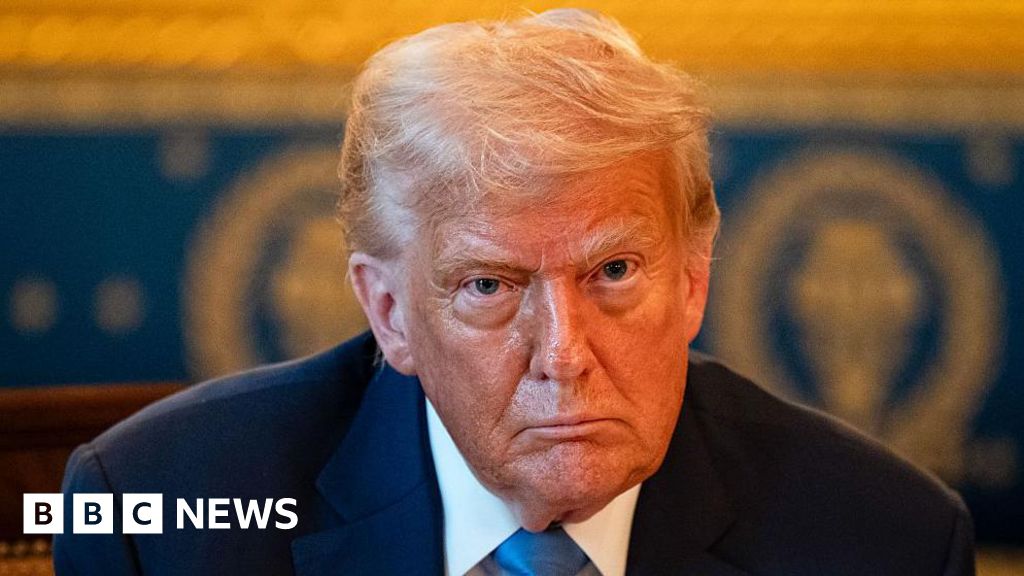Sure! Here’s a paraphrased version of the article you provided while retaining the core information and formatting it in HTML:
<div>
<div>
<div>
<span>Osmond Chia</span>
<p><span>Business reporter, BBC News</span></p>
</div>
</div>
<figure>
<div>
<img src="https://ichef.bbci.co.uk/news/480/cpsprodpb/8280/live/e4ea0d20-5bce-11f0-aee9-4be0a810fe02.jpg.webp" alt="Getty Images US President Donald Trump during a dinner with Benjamin Netanyahu, Israel's prime minister" />
<figcaption>President Trump has once again pushed back the deadline for tariff negotiations.</figcaption>
</div>
</figure>
<p>Japanese Prime Minister Shigeru Ishiba has labeled U.S. President Donald Trump's latest tariff threat, which includes a 25% tax on Japanese products, as "deeply regrettable." Japan has been striving to prevent such measures while seeking leniency for its struggling automobile manufacturers and resisting demands to open its rice market to the U.S.</p>
<p>Despite several rounds of negotiations—where Japan's tariff negotiator has visited Washington DC at least seven times since April—little progress appears to have been made. Trump's perception of Japan has shifted from "tough" to "spoiled" as discussions have dragged on.</p>
<p>This week, Japan found itself among 23 nations receiving tariff notices, with 14 of those being in Asia, highlighting concerns for many export-heavy manufacturing nations.</p>
<p>Recently, Trump pronounced a <a href="https://www.bbc.com/news/articles/cvg819n954mo" target="_blank">35% tariff on Canadian imports</a> and announced plans to hike existing tariffs from 10% to 20% across most trading partners, disregarding worries that these increases might escalate inflation.</p>
<p>With a deadline set for August 1 for reaching an agreement with the U.S., many countries may view their negotiation prospects with trepidation, especially seeing Japan—a close ally—still under threat of significant tariffs.</p>
<h2>Who Benefits: Negotiators Seeking Extra Time</h2>
<p>In many respects, the countries targeted by Trump are gaining from this deadline extension, giving them an additional three weeks to negotiate.</p>
<p>Countries like Thailand and Malaysia, which received tariff notifications, are particularly motivated to find solutions, especially given their precarious position amid escalating U.S.-China tensions. Economists suggest that prolonged negotiations are likely due to the intricate nature of trade agreements.</p>
<h2>Who Struggles: Asian Manufacturers</h2>
<p>The likelihood of ongoing tariffs suggests that global trade will face significant setbacks. International businesses, especially those from the U.S., Europe, and China, are now at risk, heavily impacting not just exporters but also U.S. importers and consumers.</p>
<p>This situation is especially damaging to the economic aspirations of many Asian countries, which have relied on manufacturing, spanning from electronics to textiles.</p>
<h2>Challenges Facing the US-Japan Alliance</h2>
<p>Despite Japan's close economic and military ties to the U.S., its treatment appears similar to that of other Asian nations, which might alter their relationship. Japan has displayed a determination to negotiate firmly, infuriating Trump with its refusal to acquiesce to some demands.</p>
<h2>Future Implications: US or China?</h2>
<p>The region is seen as a critical battleground between Washington and Beijing, with analysts arguing that Trump's tariffs might be giving China an advantage. The prolonged negotiations could dilute the U.S.'s negotiating power, altering trade dynamics established over decades.</p>
</div>This format keeps the essential details while rephrasing the content to maintain originality.



